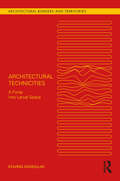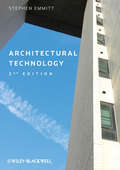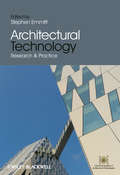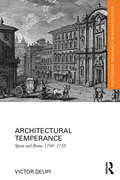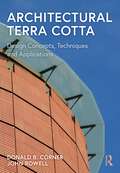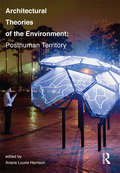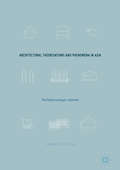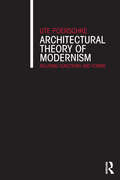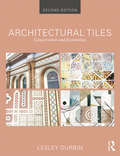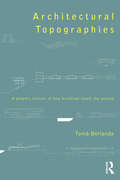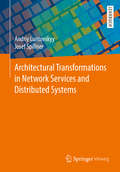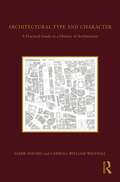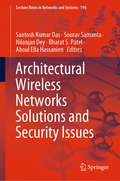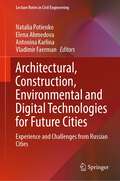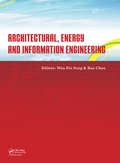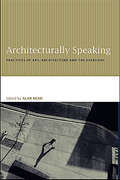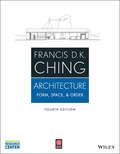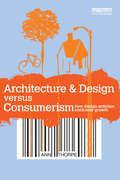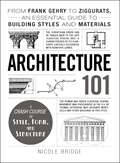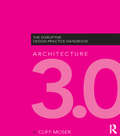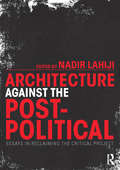- Table View
- List View
Architectural Technicities: A Foray Into Larval Space (Architectural Borders and Territories)
by Stavros KousoulasThis book poses a simple question: how is this architecture possible? To respond, it will embark on a captivating journey through many singular architectural concepts. The entasis of Doric columns, Ulysses and desert islands will outline an architectural act that moves beyond representation. A ferryman who stutters will present two different types of architectural minds. A stilus and a theory of signs will reconsider the ways architects can develop a particular kind of intuition, while architectural technicities will bring forth a membranic and territorial understanding of architecture. Finally, as a melody that sings itself, a larval architecture will be introduced, bringing space and time together. Assisting this endeavour, the thought of philosophers like Gilles Deleuze, Felix Guattari, Gilbert Simondon and Raymond Ruyer will meet the latest developments in fields like affect theory, cognitive sciences, environmental studies and neuroanthropology. Eventually, by the end of this book, the readers – from architecture students and researchers to academics and practitioners with an interest in theory – will have been exposed to a comprehensive and original philosophy of architecture and the built environment.
Architectural Technology: Research And Practice
by Stephen EmmittSince the publication of the first edition of Architectural Technology, in 2002, there have been significant developments in the number of courses, the profile of the discipline as well as significant changes in the Construction sector. The Second edition of Architectural Technology addresses these challenges directly. Much greater emphasis is given to the three core themes of the book - Environmental Sustainability; Innovation; and Design. An increase in the visual material included reinforces the critical role of Design, aiding students to better translate conceptual designs into built artefacts. Building upon solid teaching practice from the previous edition, Architectural Technology is now more concisely structured to take the reader through the whole life cycle of a building, emphasising sustainability and building performance. Material on digital information, building information modelling (BIM) and information communication technologies has been updated. Most chapters have been re-titled to emphasise the importance of design and make the book more accessible to a wider range of students. Chapters conclude with updated/more extensive links to further reading. Architectural Technology, 2nd Edition: Bridges the knowledge gap between design and construction Tackles the core subjects of management, technologies and design from a sustainable building angle Addresses the buildability and performance of a design from a whole life perspective Thoroughly revised and updated this undergraduate level textbook is essential for Architectural Technology courses. Students studying Architectural Engineering, Architecture, Building Surveying; and more general Construction courses, will find the material invaluable.
Architectural Technology: Research and Practice
by Stephen Emmitt… it gives me great pleasure to support the first ever publication to specifically address the area of research, and in particular its relationship with practice, in the discipline of architectural technology…not only ground breaking because it is the first book of its kind, but also because it provides at long last one of the accepted foundations needed to underpin the emerging academic discipline, namely a recognised research base. CIAT, in supporting this publication, is aware of the need for books such as this to sustain the process of research informed practice, as an aid for both students and those practising within the discipline of architectural technology. Norman Wienand MCIAT, Vice President Education, Chartered Institute of Architectural Technologists Architectural technology is the realisation of architecture through the application of building science, forming the constructive link between the abstract and the physical. Architectural Technology: research and practice demonstrates the importance of research in architectural technology and aims to stimulate further research and debate by enlightening, informing and challenging readers. Chapter authors address the interplay between research and practice in the field of architectural technology, examining the influence of political, economic, social, environmental and technological issues. The focus throughout is on creating sustainable buildings that are constructed economically and function effectively and efficiently within their service life cycle. The book’s mix of chapters and case studies bring together a number of different themes and provides invaluable insights into the world of research from the perspective of those working within the architectural technology field - practitioners, academics and students. The underlying message is that architectural technology is not just a profession; it is a way of thinking and a way of acting. This is highlighted by contributions from architects and architectural technologists passionate about architectural technology as a field of knowledge. Contributions range from the theoretical and polemic to the pragmatic and applied, further helping to demonstrate the richness of the field. About the Editor Stephen Emmitt is Professor of Architectural Technology at Loughborough University UK and Visiting Professor of Innovation Sciences at Halmstad University, Sweden and a member of CIAT’s Research Group.
Architectural Temperance: Spain and Rome, 1700-1759 (Routledge Research in Architecture)
by Victor DeupiArchitectural Temperance examines relations between Bourbon Spain and papal Rome (1700-1759) through the lens of cultural politics. With a focus on key Spanish architects sent to study in Rome by the Bourbon Kings, the book also discusses the establishment of a program of architectural education at the newly founded Real Academia de Bellas Artes de San Fernando in Madrid. Victor Deupi explores why a powerful nation like Spain would temper its own building traditions with the more cosmopolitan trends associated with Rome; often at the expense of its own national and regional traditions. Through the inclusion of previously unpublished documents and images that shed light on the theoretical debates which shaped eighteenth-century architecture in Rome and Madrid, Architectural Temperance provides readers with new insights into the cultural history of early modern Spain.
Architectural Terra Cotta: Design Concepts, Techniques and Applications
by John Rowell Donald B. CornerArchitectural Terra Cotta examines the evolution of terra cotta and prepares architects and builders to make new, creative uses of the timeless material. Terra cotta is among the oldest of manufactured building products, yet it has once again become a material of choice in contemporary façade design. From the walls of Babylon to high performance rainscreens, terra cotta claddings have repeatedly proven to be technically superior and aesthetically triumphant. Understanding the evolution of terra cotta prepares architects to add new, creative chapters to a rich history. This book describes the key attributes that recommend the use of terra cotta and explain its continuing success. The core of the book traces the many ways that terra cotta can be formed, finished and applied to buildings. These techniques demonstrate the full potential of the material, showing how its unique capabilities have been developed over time. A comprehensive inventory of recent examples, project case studies and architectural details, this book provide a basis for understanding the nature of the material and the opportunities it offers in new work. With over 150 color images, this volume provides a concise resource for all those considering terra cotta as a façade system: architects, façade engineers, cladding subcontractors, materials suppliers, developers and prospective clients. With inspiring examples of expressive possibility, this invaluable book will find a home with students and professionals alike interested in making rich, colorful and durable buildings.
Architectural Theories of the Environment: Posthuman Territory
by Ariane Lourie HarrisonAs architects and designers, we struggle to reconcile ever increasing environmental, humanitarian, and technological demands placed on our projects. Our new geological era, the Anthropocene, marks humans as the largest environmental force on the planet and suggests that conventional anthropocentric approaches to design must accommodate a more complex understanding of the interrelationship between architecture and environment Here, for the first time, editor Ariane Lourie Harrison collects the essays of architects, theorists, and sustainable designers that together provide a framework for a posthuman understanding of the design environment. An introductory essay defines the key terms, concepts, and precedents for a posthuman approach to architecture, and nine fully illustrated case studies of buildings from around the globe demonstrate how issues raised in posthuman theory provide rich terrain for contemporary architecture, making theory concrete. By assembling a range of voices across different fields, from urban geography to critical theory to design practitioners, this anthology offers a resource for design professionals, educators, and students seeking to grapple the ecological mandate of our current period. Case studies include work by Arakawa and Gins, Arons en Gelauff, Casagrande, The Living, Minifie van Schaik, R & Sie (n), SCAPE, Studio Gang, and xDesign. Essayists include Gilles Clément, Matthew Gandy, Francesco Gonzáles de Canales, Elizabeth Grosz, Simon Guy, Seth Harrison, N. Katherine Hayles, Ursula Heise, Catherine Ingraham, Bruno Latour, William J. Mitchell, Matteo Pasquinelli, Erik Swyngedouw, Sarah Whatmore, Jennifer Wolch, Cary Wolfe, and Albena Yaneva
Architectural Theorisations and Phenomena in Asia: The Polychronotypic Jetztzeit
by Francis Chia-Hui LinThis book is the first overall and detailed discussion of contemporary Asia's architectural theorisations and phenomena based on its heteroglossic and decolonisation character. Lin presents a theoretical journey of transdisciplinary reflection upon contemporary Asia's pragmatic phenomena which is methodologically achieved by means of elaborations of how tangible Asian architecture can be philosophically theorised and how interchangeable architectural theory is practically 'Asianised'. Discussions in the book are critically integrated with comparative studies focused on Japan, Taiwan, China, Hong Kong, Singapore, Malaysia, Australia, New Zealand and the UK. These empirical examinations are highlights of phenomenal localities, architecture, cities and cultures which reference the historicity of the Asia Pacific, Asia's contemporary architectural situations, and their subtle relationship with the 'West'. The schematisation of intended 'fuzziness' for Asia and its architecture is framed as the notion polychronotypic jetztzeit to represent a present time-place context of contemporary Asian architecture and urbanism. This book will be of great interest to scholars of Asian Studies, Architectural Studies, Postcolonial Studies, Urban Studies and Cultural Studies.
Architectural Theory of Modernism: Relating Functions and Forms
by Ute PoerschkeArchitectural Theory of Modernism presents an overview of the discourse on function-form concepts from the beginnings, in the eighteenth century, to its peak in High Modernism. Functionalist thinking and its postmodern criticism during the second half of the twentieth century is explored, as well as today's functionalism in the context of systems theory, sustainability, digital design, and the information society. The book covers, among others, the theories of Carlo Lodoli, Gottfried Semper, Eugène-Emmanuel Viollet-le-Duc, Louis Sullivan, Frank Lloyd Wright, Hannes Meyer, Adolf Behne, CIAM, Jane Jacobs, Robert Venturi and Denise Scott Brown, Charles Jencks, William Mitchell, and Manuel Castells.
Architectural Tiles: Conservation And Restoration : From The Medieval Period To The Twentieth Century
by Lesley DurbinThis book aims to advise and encourage on appropriate means towards preservation of the valuable heritage. It is an accessible resource to anyone who is interested either professionally or as an enthusiast in the preservation of historic architectural tiles.
Architectural Topographies: A Graphic Lexicon of How Buildings Touch the Ground
by Tomà BerlandaArchitectural Topographies is a critical dictionary for architects and landscape architects in which the graphic lexicon can be read from a beginning, the ground, to a conclusion, the specific case studies. Meant as a tool to help you recognise, analyse, choose, and invent solutions, the book's key words refer to the physical and material relationship between construction and ground; to where and how the link is built; to the criteria, methods, and tools used to know and transform the ground; and to the possible approaches to the place and their implications on the way the earth is touched. Fifty case studies by forty-six of the greatest architects of the previous hundred years are represented throughout in sectional drawings which place the buildings along the same ground plane to illustrate how the key words might be combined and to show each architect's position on their built work in relation to all the others. Includes projects by Alvar Aalto; Tadao Ando; Gunnar Asplund; Atelier Bow-Wow; João Batista Vilanova Artigas; Patrick Berger; Mario Botta; Marcel Breuer; Erik Bryggman; Gonçalo Byrne; David Chipperfield; Le Corbusier; Sverre Fehn; Aurelio Galfetti, Flora Ruchat, and Ivo Trumpy; Dick Van Gameren; Herzog and De Meuron; Steven Holl; Arne Jacobsen; Kengo Kuma; Anne Lacaton and Jean Philippe Vassal; Adalberto Libera; Frank Lloyd Wright; Paulo Mendes da Rocha; Ludwig Mies van der Rohe; Enric Miralles and Carme Pinos; Glenn Murcutt; Juan Navarro Baldeweg; Sheila O’Donnell and John Tuomey; Jan Olav Jensen and Børre Skodvin; John Pawson; Giuseppe Perugini, Mario Fiorentino, and Nello Aprile; Renzo Piano; Georges-Henry Pingusson; Rudolph Schindler; Roland Simounet; Alvaro Siza; Luigi Snozzi; Alejandro de la Sota; Eduardo Souto de Moura; Alison Smithson and Peter Smithson; Fernando Tavora; Jørn Utzon; Livio Vacchini; Francesco Venezia, Roberto Collovà, and Marcella Aprile; Amancho Williams; and Peter Zumthor.
Architectural Transformations in Network Services and Distributed Systems
by Andriy Luntovskyy Josef SpillnerWith the given work we decided to help not only the readers but ourselves, as the professionals who actively involved in the networking branch, with understanding the trends that have developed in recent two decades in distributed systems and networks. Important architecture transformations of distributed systems have been examined. The examples of new architectural solutions are discussed.
Architectural Type and Character: A Practical Guide to a History of Architecture
by Carroll William Westfall Samir YounésArchitectural Type and Character provides an alternative perspective to the current role given to history in architecture, reunifying architectural history and architectural design to reform architectural discourse and practice. Historians provide important material for appreciating buildings and guiding those who produce them. In current histories, a building is the product of a time, its form follows its function, irresistible influences produce it, and style, preferably novel, is its most important attribute. This book argues for an alternative. Through a two-part structure, the book first develops the theoretical foundations for this alternative history of architecture. The second part then provides drawings and interpretations of over one hundred sites from different times and places. Architectural Type and Character: A Practical Guide to a History of Architecture is an excellent desk reference and studio guide for students and architectures alike to understand, analyze, and create buildings.
Architectural Type and Character: A Practical Guide to a History of Architecture
by Carroll William Westfall Samir YounésArchitectural Type and Character provides an alternative perspective to the current role given to history in architecture, reunifying architectural history and architectural design to reform architectural discourse and practice. Historians provide important material for appreciating buildings and guiding those who produce them. In current histories, a building is the product of a time, its form follows its function, irresistible influences produce it, and style, preferably novel, is its most important attribute. This book argues for an alternative. Through a two-part structure, the book first develops the theoretical foundations for this alternative history of architecture. The second part then provides drawings and interpretations of over one hundred sites from different times and places.Architectural Type and Character: A Practical Guide to a History of Architecture is an excellent desk reference and studio guide for students and architectures alike to understand, analyze, and create buildings.
Architectural Wireless Networks Solutions and Security Issues (Lecture Notes in Networks and Systems #196)
by Aboul Ella Hassanien Nilanjan Dey Santosh Kumar Das Sourav Samanta Bharat S. PatelThis book presents architectural solutions of wireless network and its variations. It basically deals with modeling, analysis, design and enhancement of different architectural parts of wireless network. The main aim of this book is to enhance the applications of wireless network by reducing and controlling its architectural issues. The book discusses efficiency and robustness of wireless network as a platform for communication and data transmission and also discusses some challenges and security issues such as limited hardware resources, unreliable communication, dynamic topology of some wireless networks, vulnerability and unsecure environment. This book is edited for users, academicians and researchers of wireless network. Broadly, topics include modeling of security enhancements, optimization model for network lifetime, modeling of aggregation systems and analyzing of troubleshooting techniques.
Architectural and Urban Subsymmetries (Mathematics and the Built Environment #6)
by Jin-Ho ParkThis book focuses on symmetries in the analysis and synthesis of architectural designs. Crucial in the history of architecture, principles of symmetry provided the means to achieve balance and harmony of spatial composition in architecture. Less well known is the importance of symmetry principles in the analysis of the distinct constituents in a contemporary architectural design which may, at first glance, appear disorganized or even random. The revelation of different hierarchical levels wherein various types of symmetry or subsymmetry are superimposed provides a key for deciphering the underlying structure of spatial logic. The interaction between local and global subsymmetries is of particular interest. Operating with symmetry concepts in this manner offers architects, designers and students an explicit method for understanding the symmetrical logics of sophisticated designs and gaining insights into new designs.This book has two complementary objectives: to explore the fundamental principles of architectural composition founded on the algebraic structure of symmetry groups in mathematics and to apply the principles in the analysis and synthesis of architectural and urban designs. By viewing and decomposing architectural and urban designs in this manner, the hidden spatial logic and underlying order in a design become transparent.
Architectural, Construction, Environmental and Digital Technologies for Future Cities: Experience and Challenges from Russian Cities (Lecture Notes in Civil Engineering #227)
by Vladimir Faerman Natalia Potienko Elena Ahmedova Antonina KarlinaThis book offers an overview of Russian and international experience in developing the concept of future cities and its practical implementation. The concept of future cities is associated with several important trends. The first trend is the sustainable development of the urban environment and the implementation of eco-friendly technologies and materials in civil construction, industrial and power plants. The harmonious coexistence of the citizens with all forms of nature in the urban habitat becomes a great value. The second trend is the individualization of the aesthetical and architectural image of the future cities. The city's unique flavor based on the blending of the historical legacy and architectural traditions is now as important as the utility of the environment. The third trend is the digitalization of the urban environment with the use of state-of-the-art sensors, information and communication technologies, and data science. The efficiency of operations and services achieved by the extensive use of complex IoT networks becomes a value as well. The last trend is the adaptation of the urban and social environment for individual demands of a community and a person. Individual comfort and safety are now more important than ever before. By addressing these trends, the volume discusses local and international plans, practices, and technologies aimed at the development and implementation of future cities.
Architectural, Energy and Information Engineering: Proceedings of the 2015 International Conference on Architectural, Energy and Information Engineering (AEIE 2015), Xiamen, China, May 19-20, 2015
by Ran Chen Wen-Pei SungThis proceedings volume brings together selected peer-reviewed papers presented at the 2015 International Conference on Architectural, Energy and Information Engineering (AEIE 2015), held July 15-16, 2015 in Hong Kong, China. The proceedings are divided into two parts, Architectural, Energy and Environmental Engineering and Information Enginee
Architecturally Speaking: Practices of Art, Architecture and the Everyday
by Alan ReadArchitecturally Speaking is an international collection of essays by leading architects, artists and theorists of locality and space. Together these essays build to reflect not only what it might mean to 'speak architecturally' but also the innate relations between the artist's and architect's work, how they are distinct, and in inspiring ways, how they might relate through questions of built form. This book will appeal to urbanists, geographers, artists, architects, cultural historians and theorists.
Architecture
by Francis D. ChingA superb visual reference to the principles of architectureNow including interactive CD-ROM!For more than thirty years, the beautifully illustrated Architecture: Form, Space, and Order has been the classic introduction to the basic vocabulary of architectural design. The updated Third Edition features expanded sections on circulation, light, views, and site context, along with new considerations of environmental factors, building codes, and contemporary examples of form, space, and order.This classic visual reference helps both students and practicing architects understand the basic vocabulary of architectural design by examining how form and space are ordered in the built environment.? Using his trademark meticulous drawing, Professor Ching shows the relationship between fundamental elements of architecture through the ages and across cultural boundaries. By looking at these seminal ideas, Architecture: Form, Space, and Order encourages the reader to look critically at the built environment and promotes a more evocative understanding of architecture.In addition to updates to content and many of the illustrations, this new edition includes a companion CD-ROM that brings the book's architectural concepts to life through three-dimensional models and animations created by Professor Ching.
Architecture & Design versus Consumerism: How Design Activism Confronts Growth
by Ann ThorpeThe mentality that consumerism and economic growth are cure-alls is one of the biggest obstacles to real sustainability, but any change seems impossible, unthinkable. Our contemporary paradox finds us relying for our well being on consumer-driven economic growth that we actually can’t afford — not in environmental, economic or social terms. Although architecture and design have long been seen as engines for consumerism and growth, increasing numbers of designers are concerned about the problems resulting from growth. But designers face a paradox of their own; in scenarios of sustainable consumption, where people consume or build significantly less, what will be left for designers to do? This book, informed by recent research into the viability of a "steady state" economy, sets an agenda for addressing the designer’s paradox of sustainable consumption. The agenda includes ways that architecture and design can help transition us towards a new kind of economy that prioritizes real wellbeing rather than economic growth. Packed with examples and illustrations, the book argues that taking action, or activism, is an important but so far underexplored way for architects and designers to confront consumerism. The first chapters explore how economic growth and consumerism shape and are shaped by the professions of architecture, product, and landscape design and how we can understand the problem of consumerism as four main challenges that designers are already addressing. The book maps out the main issues surrounding the development of metrics that designers and others can use to measure wellbeing, instead of simply measuring economic growth. The second half of the book looks at how design activism works and its connection to growth and consumerist issues. These chapters examine how activist practices are financed, highlight five specific methods that designers use in working for social change, and investigate the power of these methods. The book concludes with a consideration of what design’s role might be in a "post-growth" society.
Architecture 101
by Nicole BridgeA crash course in designing and constructing buildingsToo often, textbooks turn the noteworthy details of architecture into tedious discourse that would put even Frank Gehry to sleep. Architecture 101 cuts out the boring explanations, and instead provides a hands-on lesson that keeps you engaged as you explore the world's greatest structures.Featuring only the most important facts, building styles, and architects, you'll enjoy uncovering the remarkable world of architecture with this book. Inside, you'll also find fascinating elements like:Illustrations of popular building styles, such as Georgian and Greek RevivalDrawings of the essential parts of different buildingsUnique profiles of the most inspirational figures in architectureFrom Norman Foster and Frank Lloyd Wright to the Beauvais Cathedral and the Empire State Building, Architecture 101 is packed with hundreds of entertaining architecture tidbits that you can't get anywhere else!
Architecture 101: From Frank Gehry to Ziggurats, an Essential Guide to Building Styles and Materials
by Nicole BridgeA crash course in designing and constructing buildingsToo often, textbooks turn the noteworthy details of architecture into tedious discourse that would put even Frank Gehry to sleep. Architecture 101 cuts out the boring explanations, and instead provides a hands-on lesson that keeps you engaged as you explore the world's greatest structures.Featuring only the most important facts, building styles, and architects, you'll enjoy uncovering the remarkable world of architecture with this book. Inside, you'll also find fascinating elements like:Illustrations of popular building styles, such as Georgian and Greek RevivalDrawings of the essential parts of different buildingsUnique profiles of the most inspirational figures in architectureFrom Norman Foster and Frank Lloyd Wright to the Beauvais Cathedral and the Empire State Building, Architecture 101 is packed with hundreds of entertaining architecture tidbits that you can't get anywhere else!
Architecture 3.0: The Disruptive Design Practice Handbook
by Cliff MoserThis book provides a definitive guide for the future direction of the practice and profession of architecture. In five parts, Cliff Moser provides you with all the tools and know-how to implement changes that will serve you and your practice in the short, medium and long term. Written at a crucial time for the industry, this is essential reading for every architect.
Architecture Against the Post-Political: Essays in Reclaiming the Critical Project
by Nadir LahijiWritten by a team of renowned contributors and carefully edited to address the themes laid out by the editors in their introduction, the book includes theoretical issues concerning the questions of aesthetics and politics and addresses city and urban strategies within the general critique of the "post-political". By focusing on specific case studies from Warsaw, Barcelona, Dubai, Tokyo and many more the book consolidates the contributions of a diverse group of academics, architects and critics from Europe, the Middle East and America. This collection fills the gap in the existing literature on the relation between politics and aesthetics, and its implications for the theoretical discourse of architecture today. In summary, this book provides a response to the predominant de-politicization in academic discourse and is an attempt to re-claim the abandoned critical project in architecture.
Architecture And Interior Design: An Integrated History To The Present
by Buie Harwood Bridget May Curt ShermanArchitecture and Interior Design: An Integrated History to the Present provides a survey of architecture, interiors, furniture, and decorative arts from the past to the present. It is a completely integrated and interdisciplinary reference for: architecture, architectural details, architectural surface treatments, space planning, interior design, interior architectural features, interior surface treatments, motifs, furniture, color, lighting, textiles, and decorative accessories. The unique scope allows comparison in all areas of the built environment through the centuries to illustrate historical, social, cultural, and stylistic influences. Narrative and graphics interweave design analysis with architectural and design history.
